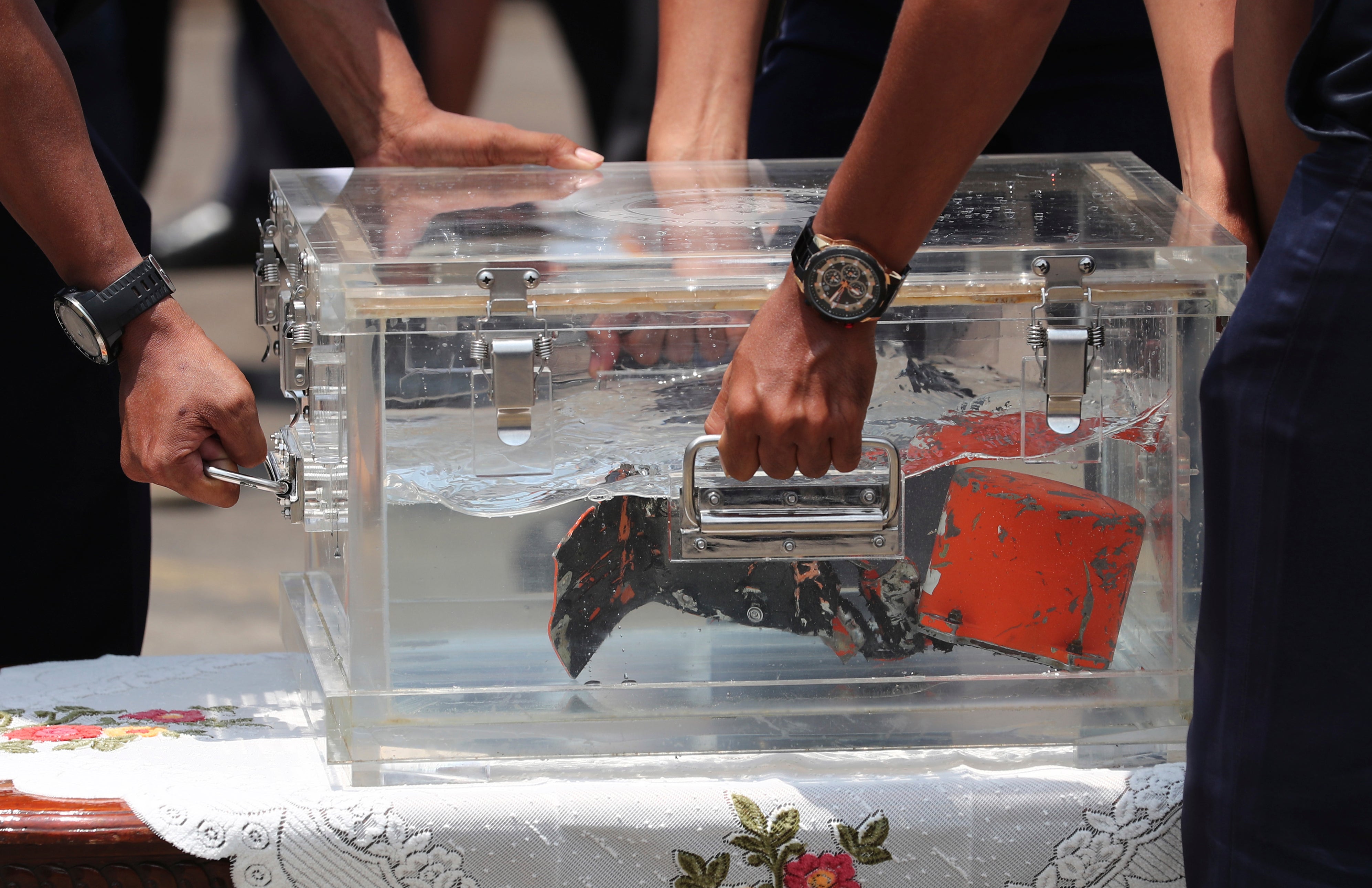Indonesia finds Sriwijaya Air jet's cockpit voice recorder
Indonesia's transport minister says navy divers have recovered the cockpit voice recorder of a Sriwijaya Air jet that crashed into the Java Sea in January with 62 people on board

Your support helps us to tell the story
From reproductive rights to climate change to Big Tech, The Independent is on the ground when the story is developing. Whether it's investigating the financials of Elon Musk's pro-Trump PAC or producing our latest documentary, 'The A Word', which shines a light on the American women fighting for reproductive rights, we know how important it is to parse out the facts from the messaging.
At such a critical moment in US history, we need reporters on the ground. Your donation allows us to keep sending journalists to speak to both sides of the story.
The Independent is trusted by Americans across the entire political spectrum. And unlike many other quality news outlets, we choose not to lock Americans out of our reporting and analysis with paywalls. We believe quality journalism should be available to everyone, paid for by those who can afford it.
Your support makes all the difference.Indonesian navy divers have recovered the cockpit voice recorder of a Sriwijaya Air jet that crashed into the Java Sea in January, killing all 62 people on board, officials said Wednesday.
Transportation Minister Budi Karya Sumadi said divers retrieved the cockpit recorder at about 08.00 p.m. Tuesday local time, near where the flight data recorder was recovered three days after the accident.
The contents of the recorder were not immediately available. However, the device could help investigators determine what caused the Boeing 737-500 to nosedive into the ocean in heavy rain shortly after it took off from Jakarta on Jan. 9.
If the voice recorder is undamaged, it might tell investigators what the pilots were doing — or failing to do — to regain control of the plane during its brief, erratic flight.
Searchers have recovered plane parts and human remains from an area between Lancang and Laki islands in the Thousand Island chain, just north of Jakarta. The flight data recorder tracked hundreds of parameters showing how the plane was being operated.
Most retrieval efforts ended about two weeks after the crash, but a limited search is continuing for the missing memory unit of the cockpit voice recorder, which apparently broke away from other parts of the device during the crash.
The bright orange voice recorder was taken to Jakarta and given to the National Transportation Safety Committee, which is overseeing the accident investigation.
“We hope the KNKT could share information about what is contained in this VCR to improve our aviation safety,” Sumadi said, referring to Indonesian acronym for the transportation committee.
The KNKT chairman, Soerjanto Tjahjono, said the device will be taken to the investigators’ “black box” facility. It will take five to seven days to dry and clean the device and to download its data, he said.
“Without the CVR . . . it would be difficult to determine the cause of the plane crash,” Tjahjono said, “We would disclose it transparently to avoid similar accidents in the future.”
Rear Adm. Abdul Rasyid Kacong, the navy’s western region fleet commander, said the voice recorder was buried under 1 meter (3 feet) of seabed mud at a depth of 23 meters (75 feet). Divers removed debris and carried out “desludging” operations to reach the voice recorder, he said.
Data from a preliminary investigation report, which didn’t state any conclusions, showed that the plane’s left engine’s throttle lever moved backward on its own while the autopilot was engaged, reducing the power output of that engine before the jet plunged into the sea.
That report provided new details on persistent problems with an autothrottle on the 737-500 Sriwijaya Air jet and the airline’s efforts to fix them. An autothrottle can be used by pilots to set the speed automatically, thereby reducing workload and wear on the engines.
The 26-year-old jet had been out of service for almost nine months because of flight cutbacks due to the pandemic before resuming commercial flights in December.
The disaster has reignited concerns about safety in the aviation industry, which has grown quickly along with the economy since the fall of dictator Suharto in the late 1990s. The United States banned Indonesian carriers from operating in the country in 2007 but lifted that restriction in 2016, citing improved compliance with international aviation standards. The European Union lifted a similar ban in 2018.
Sriwijaya Air had had only minor safety incidents in the past, though a farmer was killed in 2008 when a plane went off the runway while landing due to a hydraulic issue.
In 2018, a Boeing 737 MAX 8 jet operated by Lion Air crashed shortly after taking off from the airport in Jakarta, killing 189 people. An automated flight-control system played a role in that crash, but the Sriwijaya Air jet did not have that system.
____
Associated Press writers Niniek Karmini and Edna Tarigan contributed to this report.